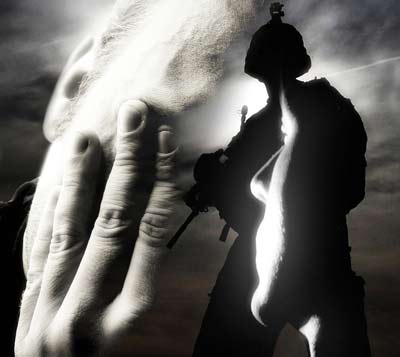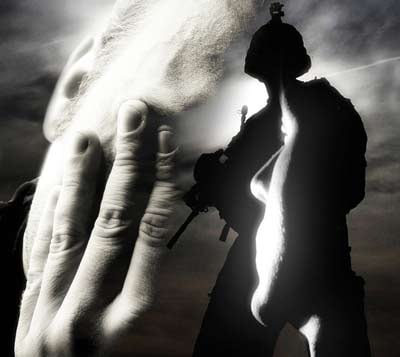
Support justice-driven, accurate and transparent news — make a quick donation to Truthout today!
 (Image: Lance Page / TO; Adapted: assbach, isafmedia, Uqbar is back)In Essex Junction, Vermont, on April 26, 2014, a teenager was forced to fatally shoot his father in self-defense after Kryn Miner threatened to kill the family. I have yet to see any talking heads or bloggers parsing the fatal family feud, which is grotesquely irresponsible when you consider that this country’s foreign policies and government agencies had a hand in what happened.
(Image: Lance Page / TO; Adapted: assbach, isafmedia, Uqbar is back)In Essex Junction, Vermont, on April 26, 2014, a teenager was forced to fatally shoot his father in self-defense after Kryn Miner threatened to kill the family. I have yet to see any talking heads or bloggers parsing the fatal family feud, which is grotesquely irresponsible when you consider that this country’s foreign policies and government agencies had a hand in what happened.
Kryn Miner was a 44-year-old Chief Warrant Officer 2 with the Vermont Army National Guard, with two and a half decades of service, including 11 military deployments in seven years, most recently Afghanistan in 2010. Every combat tour escalates the likelihood of developing Post-Traumatic Stress Disorder (PTSD), so after 11 tours, the question is less whether there’s PTSD than how much. US citizens refused to end the war, instead calling on reserve forces to fight for them in unprecedented numbers, even though we have known for decades that reservists consistently suffer more, and more severe, post-combat mental health problems than active duty troops.
National Guardsmen have been found to have rates of PTSD as much as three times higher than active duty troops after combat. Guard veterans also report more alcohol abuse, suicidal ideation and incidents of aggressive behavior. The vast differentials in mental health outcomes between reserve and active duty are primarily due to: the lack of post-deployment unit support; markedly poorer post-deployment mental health services and follow-up; and the rapidity with which citizen soldiers return to civilian life after combat. Factor in a Traumatic Brain Injury (TBI), which also often increases aggression and reduces impulse control, and you’ve got a recipe for deadly domestic assault in the veteran’s home. In this case, it was Kryn Miner’s home, and what happened in the dawn’s early light of April 26 was less the exception than the rule of how these wars are coming home for the families of vets with PTSD and TBI.
A growing body of evidence shows that the majority of veterans with those conditions have committed at least one act of interpersonal violence, and nearly half of those were severe. I recall being on a conference call with spouses of combat vets a few years back when one of the women asked, “Who hasn’t been strangled by their husband?”
Not one of us spoke up.
Amy Miner, Kryn’s widow, disclosed at least one previous incident where her husband had become agitated and threatened her and their four children with a gun. She was able to talk him down, but she didn’t report it, which is pretty typical, because those of us who fell in love with our spouses before they went to war know that they weren’t like this before.
We know that the battle buddy who had their back over there isn’t here, and we aren’t going to lose one more goddamn thing to this war. We know that we are the firewall between our veteran and homelessness, and even in the midst of this awful dark sickness, we believe that there might be a light waiting for us somewhere on the other side.
We know that while all vets are changed by war, some of them actually do come back just fine, if not better than before. We understand (trust me that we do) that our veterans have to be held accountable, but we also understand this: so does the United States.
Our nation’s leaders are accountable, too, in how they chose to initiate and prosecute these wars. The United States’ Department of Veterans Affairs is accountable in how it treats, or refuses or delays to treat, returning veterans. The people of America, who asked for so much for so long, but gave little, if anything at all? They, too, are accountable to what was, or wasn’t, done in their name, or by their votes and with their consent. Those factors contributed to the shooting death of a Guard veteran with compound combat trauma.
My husband has that same compound trauma. He’s an 80 percent service-connected, disabled, two-time Iraq war veteran who retired from the Army National Guard after 27 years of honorable service. His untreated war wounds cut a path of destruction through the center of our lives, and I find it obscene that this country still refuses to take responsibility for its role in the tragedy unfolding on the American Homefront and find ways, right now, to stop it.
Press freedom is under attack
As Trump cracks down on political speech, independent media is increasingly necessary.
Truthout produces reporting you won’t see in the mainstream: journalism from the frontlines of global conflict, interviews with grassroots movement leaders, high-quality legal analysis and more.
Our work is possible thanks to reader support. Help Truthout catalyze change and social justice — make a tax-deductible monthly or one-time donation today.